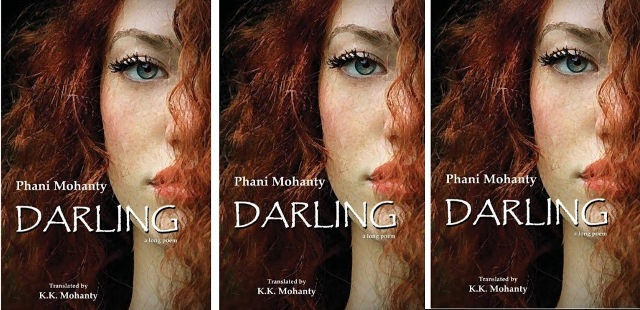Love, Fate, and Regret: Unraveling Priyatama by Dr. Phani Mohanty

Dr. Phani Mohanty, a celebrated Kendriya Sahitya Akademi and Odisha Sahitya Akademi awardee, has gifted literature lovers a masterpiece in the form of Priyatama. This iconic work transcends linguistic boundaries, having been translated into multiple languages, including English, Hindi, Marathi, Bengali, Gujarati, and Nepali, among others. Through Priyatama, Dr. Mohanty conjures an imaginary beloved who comes alive with such fervor that readers are irresistibly drawn into her charm and spirit.
A delicate blend of love and pain weaves the fabric of this poetic creation, painting emotions with strokes of beauty and intensity. The fragrance of love emanating from Priyatama is profound, touching the deepest corners of the heart. In his affection, the poet tenderly calls his beloved by enchanting names like Shyama, Sutapa, Visakha, Kanta, and Manorama. Each name reflects a facet of his boundless adoration, unveiling his passionate devotion to his muse.
The essence of Priyatama lies in its ability to transport the reader into the poet’s world—a world brimming with longing, devotion, and a love so divine that it feels eternal. Through his verses, Dr. Mohanty speaks not just of his Priyatama but of love itself, in its most sublime and poignant form. The resonance of his emotions lingers, making Priyatama a timeless ode to the beauty and transcendence of love. In its every word, it offers a glimpse of the eternal, a love that transcends time, space, and the heart’s deepest yearning.
“Deserting me alone you left
…..and you left, I am sinking and sinking
With every passing moment
In fathomless mid-ocean.” ( Stanza 1, page- 11, Darling)
This stanza from Priyatama captures a profound sense of isolation and despair, evoking the imagery of sinking into an endless, unrelenting void. The phrase “Deserting me alone you left” immediately sets a tone of abandonment, suggesting that the poet has been left behind by a beloved, who was once a source of comfort and support. The repetition of “left” emphasizes the emotional weight of the departure, reinforcing the finality of the separation.
The next line, “And you left I am sinking and sinking,” intensifies this feeling of loss, with the poet sinking deeper into emotional turmoil. The repetition of “sinking” mirrors the overwhelming, continuous nature of this emotional descent. It suggests a sense of helplessness and the inability to escape from this despair, as if each moment brings them closer to an unfathomable depth.
The imagery of “fathomless mid-ocean” enhances the sense of hopelessness and isolation. The ocean, vast and endless, represents both the lover’s emotional state and the infinite, incomprehensible nature of their suffering. The use of “fathomless” suggests that the speaker cannot grasp the full extent of their grief, much like an ocean that has no visible end. It also symbolizes the vastness of the emotional void they are now drowning in, a metaphor for the overwhelming feeling of abandonment.
“Are you the comely cloud
Floating layer on layer
Appearing so alluring
In life and even in death .” ( stanza 1, page no- 36, Darling)
Here Dr. Mohanty beautifully intertwines nature imagery with philosophical reflection. The opening line, “Are you the comely cloud,” sets the stage for a comparison of the beloved to a cloud—something delicate, serene, and ethereal. The use of “comely” emphasizes the beauty and allure of the subject, suggesting that, like a cloud, they embody a natural, graceful beauty. This image evokes a sense of lightness and impermanence, implying that the subject is transient, yet captivating in their momentary presence.
The phrase “Floating layer on layer” adds to the layered complexity of the cloud, mirroring the complexity of the beloved’s nature. It suggests that, like a cloud’s ever-changing form, the subject is multifaceted and ever-evolving. This movement and progression signify the depth and dynamism of their being, and perhaps the subtle, hidden layers of their personality or existence. The imagery further reinforces the notion that the subject is not static but always shifting, like the cloud that moves across the sky, elusive yet mesmerizing.
The line “Appearing so alluring” enhances the cloud metaphor, portraying the subject as irresistibly captivating. Clouds, with their delicate and shifting shapes, often hold an enchanting appeal, and here, the subject is likened to something that draws the observer’s gaze with their allure. This allure is not merely physical but may extend to their inner qualities, their presence, and their spirit.
Finally, the stanza’s closing line, “In life and even in death,” deepens the emotional and philosophical tone. The beauty and allure of the subject are portrayed as timeless, unaffected by the transient nature of life. Just as a cloud continues to exist in different forms, perhaps even beyond the visible, the subject’s essence remains enduring, transcending even death. This adds a layer of existential reflection, suggesting that beauty and allure are not bound to the physical form but extend into the realm of spirit or memory. The stanza, in its entirety, is a poetic meditation on the ephemeral nature of existence and the enduring beauty that persists beyond it.
“Everyone is curious …..asking
Tell us, Oh poet, who is your priyatama
For whom you are penning
Volumes of love poems,
Is your priyatama, oh poet, a Deity
Made of blood and tear, or
Devil, tell once with open mind…
Better the song of life left unsung. ” ( Stanza 3, page no- 59, Darling)
This stanza from Priyatama by Dr. Phani Mohanty is an insightful reflection on the complexity of love, its dualities, and the emotional conflict it can create in the poet’s mind. It delves into existential questions, where the poet is grappling with whether their beloved is divine or demonic. The juxtaposition of “Deity” and “Devil” captures the essence of love’s contradictions—its potential to elevate and to torment. The final line, “Better the song of life left unsung,” underscores the poet’s ambivalence, suggesting that love, if it becomes too convoluted or painful, may be best left unexpressed. This examination of love, as both a source of joy and anguish, is reminiscent of many romantic poets, but also offers a unique, introspective take on the subject.
These lines make me remind of William Blake, the great literary figure of romantic age whose poems often explore the dualities of human existence, much like the stanza in Priyatama. In poems such as The Tyger and The Lamb, Blake contemplates the contrast between innocence and experience, beauty and terror. His work frequently explores the complexity of good and evil, much like the question of whether the “priyatama” is a deity or a devil. The idea of love as a force that can be both nurturing and destructive, as seen in this stanza, echoes Blake’s own exploration of the divine and the demonic in his Songs of Innocence and Experience. Both poets grapple with the tension between the ideal and the flawed.
I also can find a glimpse of romantic essence like priyatama in Byron’s poetry is known for its emotional intensity, and like Dr. Phani Mohanty, he frequently portrays love as a force that can be both elevating and destructive. In Childe Harold’s Pilgrimage, Byron’s portrayal of romantic love often reflects the same internal conflict seen in Priyatama. For instance, in Byron’s Don Juan, love is depicted with both its passionate allure and its potential for despair and betrayal. The uncertainty and complexity of love, evident in Mohanty’s stanza, mirrors Byron’s own ambivalence toward romantic relationships, where love is often portrayed as both a source of joy and suffering.
“Had I anticipated the impending
Huge disasteron way back home
I would have, half way, taken a detour…..
Would have stopped my scooter
Abiding by traffic rules, the inauspicious
Accident hour would have passed
During my wait, there would have been
No traffic snarls on streets. ” (Stanza 1, page no – 86, Darling)
This passage, in its reflective and regretful tone, shares strong thematic parallels with the works of Robert Frost, particularly his poem The Road Not Taken. Frost’s poetry often explores the impact of choice, the weight of decisions, and the sense of “what might have been,” similar to the introspection and regret found in this passage.
In the stanza, the Dr. Mohanty contemplates their choices in hindsight, expressing regret about the accident and what could have been different. The hypothetical “if only” scenarios—taking a detour or abiding by traffic rules—echo the reflective quality of Frost’s The Road Not Taken, where the poet looks back on their life and regrets not choosing the other path. The line “Had I anticipated the impending / Huge disaster” mirrors the sentiment in Frost’s poem:
“I shall be telling this with a sigh / Somewhere ages and ages hence.”
Both the poets are musing on the past with a sense of irreversible decision and a desire to undo what has happened. It is deeply concerned with the tension between choice and fate, questioning whether different decisions could have led to a better outcome. Similarly, Frost’s poem highlights the weight of decision-making:
“I took the one less traveled by, / And that has made all the difference.”
Frost’s protagonist, like the poet in this passage, is reflecting on the consequences of a choice that, in hindsight, seems significant. While the speaker in the passage seems to feel that fate played a role (“impending disaster”), Frost’s hero suggests that the road taken made a profound impact on their life, though they cannot know for sure how the other path would have affected them.
“Forget not my last supplication
At my departure:
Never entertain sinful thoughts
Never tell anyone …
Even yourself
That once you had betrayed me. ( Stanza 1, page no -93, Darling)
This stanza with its plea for forgiveness, self-reflection, and emotional vulnerability, carries a sense of profound regret and emotional complexity. It speaks of a departure, perhaps in the context of love or a relationship, where the speaker is asking the listener or the beloved not to entertain any sinful thoughts or to ever acknowledge a betrayal. This evokes themes of guilt, forgiveness, and the complexity of human emotions.
A strong comparison can be made with William Shakespeare’s Sonnet 66, in which the poet laments the corruption of the world, desiring escape from it. While the passage you provided focuses on the plea for forgiveness and the concealment of a past betrayal, Sonnet 66 similarly delves into the theme of regret and the desire to erase or forget painful truths.
The stanza begins with the plea, “Forget not my last supplication / At my departure,” which suggests a sense of finality, akin to the speaker’s desire in Shakespeare’s Sonnet 66 to escape the painful truths of life. Shakespeare writes:
“Tired with all these, for restful death I cry, / As to behold desert a beggar born, / And needy nothing trimm’d in jollity.”
Both the stanza and the sonnet express a longing to leave behind sorrow or regret. While the poet in the passage asks for the betrayal to be hidden, Shakespeare’s protagonist desires to escape a world full of injustice and corruption. In both cases, the poets are haunted by painful truths and seek an escape, either through death or silence.
The line, “Never entertain sinful thoughts / Never tell anyone… / That once you had betrayed me,” suggests a deep emotional wound. The poet is asking not just for forgiveness but for the betrayal to remain hidden, even from oneself. In Shakespeare’s Sonnet 66, there’s a similar sense of betrayal of the natural order of things, where:
“That thou art blam’d for being a thief, / A false traitor, and a liar.”
Shakespeare’s speaker expresses the desire to escape the betrayal of the natural order of the world. While the passage focuses on a personal betrayal, the shared sense of emotional turmoil in both works points to the human struggle with guilt and shame.
This stanza of Dr Mohanty and Shakespeare’s Sonnet 66 both grapple with themes of regret, emotional vulnerability, and the desire to escape painful truths. The poet in the passage wishes to bury the memory of betrayal, asking that it not even be acknowledged by the person who inflicted it. Shakespeare’s speaker in Sonnet 66 similarly wishes for escape from the world’s injustices, where the corrupt actions of others cast a shadow over all that should be good and pure. In both works, there is a deep yearning for peace, either through forgiveness or through the eradication of painful memories. The emotional vulnerability in both the passage and Shakespeare’s sonnet shows a profound understanding of the human condition and the weight of our regrets and the desire for relief from them.
“Even in dream never forget
My last supplication at
My departure,
In deluge even if our love-laden
Canoe is devastated to extinction
I shall do japa of your name, Dear
For millions ages and eons…. ” ( Stanza-42, page no- 94)
These lines express a profound and unwavering devotion. The poet vows to never forget their last supplication upon departure, even in the face of overwhelming adversity. The imagery of a “love-laden canoe” being “devastated to extinction” in a deluge symbolizes the trials and struggles of life, yet the speaker’s commitment remains unshaken. The act of performing japa—the repetitive chanting of the beloved’s name—becomes a symbol of spiritual endurance, a practice that transcends both time and hardship. The promise to continue this devotion for “millions ages and eons” reinforces the eternal nature of the speaker’s love and faith. The tone is both solemn and intense, portraying an emotional depth that is unyielding even in the face of destruction. The blending of natural imagery with spiritual commitment creates a timeless, universal sentiment of devotion that resonates deeply.
At the end of the poem, the poet beautifully conveys a sense of longing and hope, even in the face of death. The hope against hope to hear the “jingling sound” of the darling’s anklet before peacefully passing away reflects a deep yearning for a final connection with the beloved. This subtle yet powerful image suggests that the poet seeks not only spiritual transcendence but also the comforting presence of their love in the final moments. The jingling sound, often associated with movement, life, and joy, symbolizes the poet’s desire for one last sensory reminder of their beloved before surrendering to death. This element of the poem adds a layer of intimacy and wistfulness, making the poet’s devotion all the more poignant, as he clings to a fleeting moment of earthly connection even as he approaches the end. The contrast between the eternal devotion expressed earlier and this final earthly longing emphasizes the deep emotional conflict and tenderness of the human experience.
Priyatama highlights Dr. Phani Mohanty’s deep exploration of love, existential questions, and the complexities of human emotion. His work reflects a profound engagement with the dualities of love, portrayed as both divine and demonic, echoing themes found in classic Romantic poetry, particularly the works of William Blake, Lord Byron, John Keats, and Percy Bysshe Shelley. The reflective, regretful tone in the passage contemplating an accident draws parallels with Robert Frost’s The Road Not Taken, where the tension between choice and fate is central. Similarly, the emotional vulnerability and plea for forgiveness in Mohanty’s stanza resonate with Shakespeare’s Sonnet 66, where regret, guilt, and the desire to shield oneself from painful truths are key themes. Overall, Priyatama engages with timeless human struggles—love, fate, regret, and forgiveness—capturing the essence of Romanticism while offering a unique, introspective perspective on the intricacies of relationships and personal reflection.







